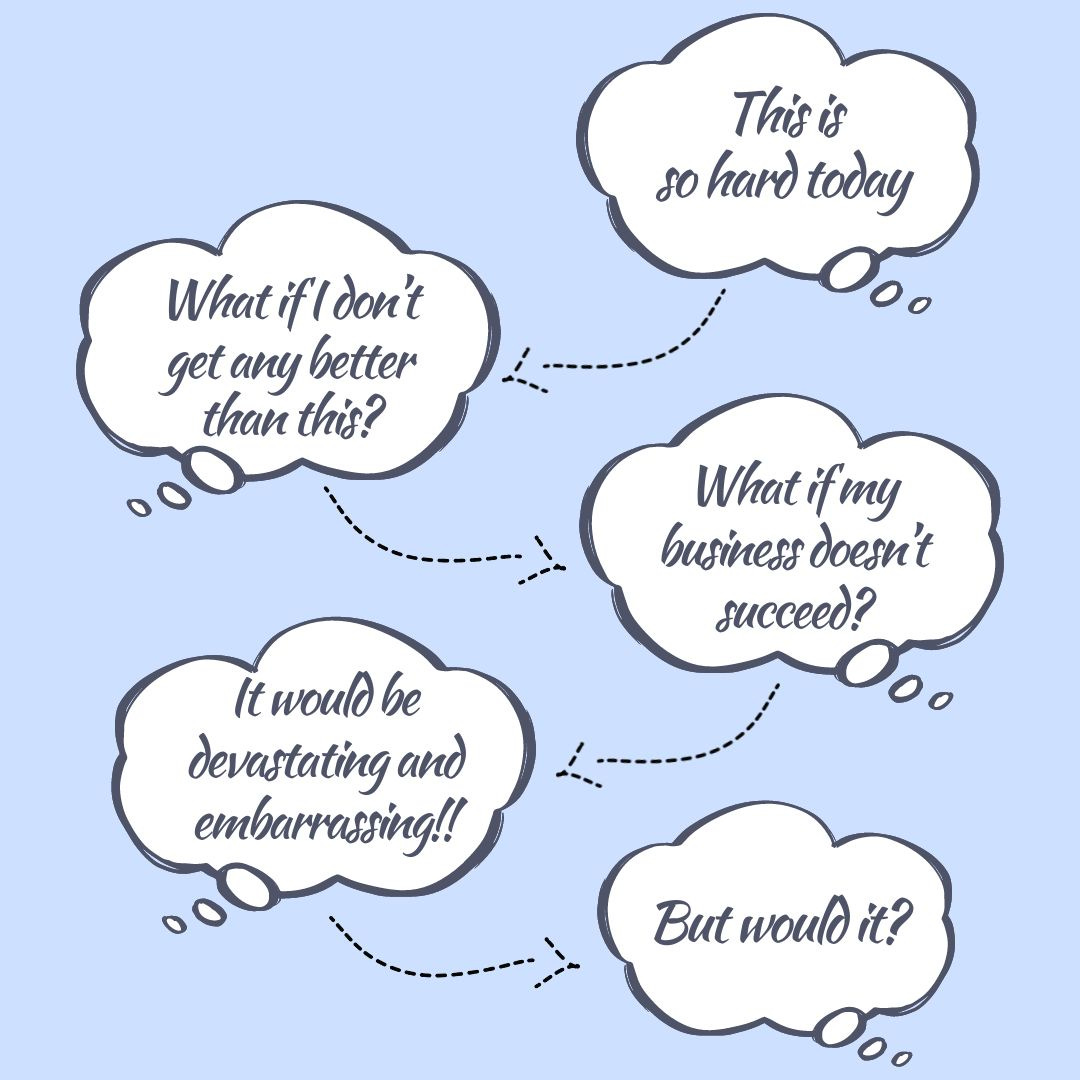Has negative self-talk ever gotten the best of you?
A personal story about inner voice, negative mental chatter, and self-compassion
I cried during my workout today
It's 9:30 AM. I'm spinning in a 45-minute group cycle class with what feels like imaginary sand weights on my ankles the whole dang time.
I notice I'm operating at about 50-60% of what I have seen myself output in previous classes. While comparing yourself to another person's ability can be a set up for disappointment, even self-comparison can be discouraging.
It's so easy to feel dissatisfied when you know you "could do better" or "have done better in the past".
I remember that I've been trying to apply self-talk principles to my workouts--encouraging self-talk is my preferred mindset booster. (Practice what you preach, right?)
5 minutes in... I tell myself, "your muscles are just waking up"
15 minutes in... It still sucks. I think, "wow I'm focusing on my breathing a lot today. Is it hotter in here?!"
I sprinkle in a few words of encouragement—"You can do hard things. Keep going." I even try some instructional self-talk as I remind myself to "lift, lift" with each pedal stroke.
30 minutes in... It all falls apart.
Suddenly, I'm having a silent (and covert) emotional meltdown in the front row. Thank goodness it’s dark! Clearly, my uplifting self-talk talk is not sticking like it usually does. In fact, the more attention I draw to my body and how lethargic it feels, my mind can’t help but repeat the phrase,
This is so hard today.
As I dig a little more into my emotions, disappointment is only part of my current experience. I soon realize that my repetitive thought is linked to another more deeply rooted and emotionally charged belief that rapidly unfurls...
What if I don't get any better than this?
I hold back the tears. It dawns on me—this fear is exactly how I've been secretly feeling all along.
Even worse is the realization that this belief is pervasive. It extends beyond my current level of physical fitness. The next thought appears,
What if my business doesn't succeed?
From a survival standpoint, this catastrophic thought chain makes perfect sense. Immediately my mind labels what that fictitious outcome might be as my thoughts continue to spiral. It exclaims,
IT WOULD BE DEVASTATING AND EMBARRASSING!
I feel my negative mental chatter pause at this dramatic exclamation.
In this space, I break away from the noise.
...but would it?
I soften, and internally give myself a big hug. I imagine it’s like a wonderful bear hug from my Dad…one that I can just disappear into.
For a moment, I hold that scared part of myself.
I see her. I understand her.
Reflect
When is it difficult for you to maintain productive and supportive self-talk?
What repetitive negative mental chatter do you notice in your day to day? How do those thoughts impacting your feelings and behaviors?
How satisfied are with the strategies you are using to navigate negative self-talk? How might you improve in this area? (Check out mental drill #2 at the bottom!)
Just as suddenly as the crash of my emotional wave, the song ends.
A new tempo emerges that I match with my pace.
As expected, I find my feelings wash away.
Then, to my surprise, I hear a whisper,
"Oh my dear, but what if you do succeed?"
I softly smile.
I remember, I don't have to believe every disastrous thought I think...but I can hold space for it. And then, a new thought can come into view.
I look around and feel encouraged that I am surrounded by others doing hard things. Each one going at their own pace but also, not quitting when their minds want them to give up. I am thankful.
In all of this, I see the gift I can give myself today—to have compassion toward myself despite my fears and my self-judged "below average performance."
I bravely choose to remind myself,
You are here. You are still pedaling. That is enough.
And you know what?
Those last few minutes of class, didn't suck as much.
Extend kindness to yourself today. It's the bravest thing you can do.
Mental drill #2. Distanced self-talk
Taking a moment to step-back and create some distance from your negative mental chatter can open your perspective to be more objective. This is one strategy offered by Psychologist Ethan Kross in his book Chatter. Essentially, this will feel like you are silently coaching yourself through a situation.
Speak to yourself in the third-person—use your name or even a nickname
“Let’s go, Diane.”
“Come on, Di. Keep at it.”
Use statements with the pronoun “you” as if you were a good friend giving advice or encouragement
“You are enough.”
“If you think, ‘what if I fail’ then shouldn’t you equally consider the thought, ‘what if I succeed?’”
If you enjoy Athletes who Thrive, please let others in your community know! Athletes who Thrive is public so please share if you think an athlete, coach, or sport parent may benefit from reading it. If you haven’t subscribed yet, it’s easy and free! Posts will go straight to your email inbox or SubStack app. Have a question or topic you’d like me to write about? Send me a message!





